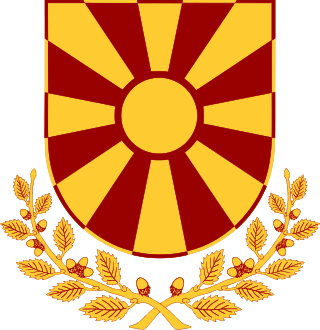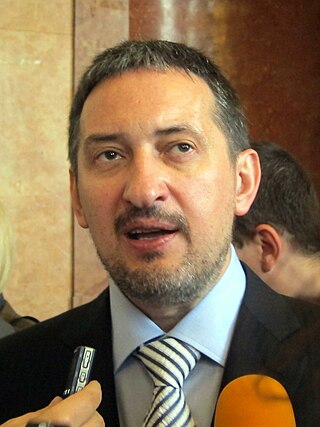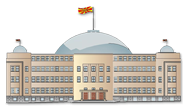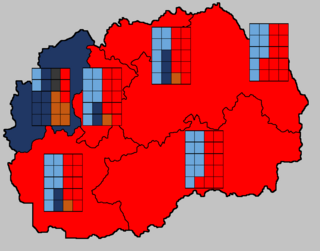
The Internal Macedonian Revolutionary Organization – Democratic Party for Macedonian National Unity, often simplified as VMRO-DPMNE, is a conservative political party in North Macedonia and is the main centre-right to right-wing party in the country.

The Liberal Party of Macedonia is a conservative-liberal political party in North Macedonia. The party was a member of the Alliance of Liberals and Democrats for Europe Party but is no longer a member. It is currently led by Ivon Velickovski.

The president of the Republic of North Macedonia is the head of state of North Macedonia.

Nikola Gruevski is a former Macedonian politician who served as Prime Minister of Macedonia from 2006 until his resignation, which was caused by the 2016 Macedonian protests, and led the VMRO-DPMNE party from 2004 to 2017.

Ljubčo Georgievski or Lyubcho Georgievski is a Macedonian politician who served as the only Vice President of Macedonia from January to October 1991 and as the Prime Minister of Macedonia from 1998 to 2002. He is considered one of the pioneers of the country's independence.

The Assembly of the Republic of North Macedonia, or the Sobranie, is the unicameral legislature of North Macedonia. According to the Constitution, the Sobranie represents the people and is vested with legislative power. It can have between 120 and 140 MPs, elected by proportional representation from 6 electoral districts, each contributing 20 MPs, and there are also 3 reserved seats elected from the Macedonian diaspora which are awarded only if the voter turnout was sufficient. MPs are elected for a term of four years and cannot be recalled during their term. The Sobranie is presided over by a President. Its organization and functioning are regulated by the Constitution and Rules of Procedure. The Assembly's seat is in the Sobranie Palace in country's capital Skopje.

An autonomy referendum was held in Macedonia on 7 November 2004. Voters were asked whether they approved of overturning the municipal redistricting plans that gave greater autonomy to ethnic Albanians following the Ohrid Agreement that ended the 2001 conflict between ethnic Albanian militants and the predominantly ethnic Macedonian government forces. These had been changed to give ethnic Albanians greater control in districts where they had significant presence and gives local authorities greater control over education, health and development. It also reduced the number of municipalities from 123 to 84.
The World Macedonian Congress is a Macedonian diaspora organization based in Skopje. It presents itself as an organization fighting and demanding for more human rights to ethnic Macedonians on an international level, but is seen as a nationalist or ultranationalist organization by researchers. The organization was registered during the fall of communism, on 15 September 1990 by Todor Petrov, who is also the president of the organization.

Gjorge Ivanov is a Macedonian politician, who served as the 4th President of North Macedonia from 2009 to 2019.

The University of Information Science and Technology "St. Paul The Apostle" is a public university in North Macedonia. As of 2018–19 school year, a total of 375 students are enrolled at the university.

VMRO – Bulgarian National Movement, commonly known as VMRO, is a national conservative political party in Bulgaria.

Early parliamentary elections were held in the Republic of Macedonia on 5 June 2011, a year earlier than necessary. All 123 parliamentary seats of the Sobranie were due for election, including the 3 seats provided for the first time for representatives of the Macedonian citizens living abroad: 1 from Europe, 1 from North America, and 1 from Asia and Australia. The decision of the ruling parties, the Christian Democratic VMRO-DPMNE and the ethnic Albanian Democratic Union for Integration (DUI), to dissolve the Parliament and call for an early election was preceded by protests of the Social Democratic Union (SDSM), the major opposition party, and subsequent boycott of the Parliament by them, and by other smaller opposition parties.

General elections[a] were held in the Republic of Macedonia in April 2014 to elect the President and members of parliament. The first round of the presidential elections were held on 13 April, with incumbent president Gjorge Ivanov finishing first with 53% of the vote. However, as he did not receive the support of 50% of all registered voters, a second round was held on 27 April, alongside parliamentary elections, with Ivanov and the ruling coalition led by VMRO-DPMNE claiming victory as Ivanov was elected president and the VMRO-DPMNE won 61 of the 123 seats in the Assembly.

The fourth Cabinet of Prime Minister Nikola Gruevski is the Republic of Macedonia Government cabinet announced on 19 June 2014. It is the 11th cabinet of the Republic of Macedonia. Gruevski's second cabinet was formed following the April 2014 election won by the right-wing VMRO-DPMNE.

In April 2016, protests began in the Republic of Macedonia against the incumbent President Gjorge Ivanov and the government led by the interim Prime Minister Emil Dimitriev from the ruling VMRO-DPMNE party. Referred to by some as the Colorful Revolution, the protests started after the controversial decision by President Gjorge Ivanov to stop the investigation of former Prime Minister Nikola Gruevski and dozens of politicians who were allegedly involved in a wiretapping scandal. The demonstrations were organized by "Protestiram" and supported by a coalition led by the Social Democratic Union of Macedonia and other opposition parties, in addition to the newly formed Levica demanding that the government resign and be replaced by a transitional government and that the parliamentary elections planned for 5 June 2016 be cancelled, on the grounds that the conditions for free and transparent elections were not in place. The government and its supporters, who had organized pro-government rallies, maintained that the elections on June 5 were the only solution to the political crisis, with some observers blaming the opposition for creating a "Ukraine scenario" in Macedonia.
Local elections were held on October 14–15 and 28–29, 2017, in the Republic of Macedonia to elect mayors and members of municipality councils of the 80 municipalities in Macedonia. These were the sixth local elections since the independence of Macedonia.
Storming of the Macedonian Parliament, also known as Bloody Thursday occurred on 27 April 2017, when about 200 Macedonian nationalists stormed the Macedonian Parliament in reaction to the election of Talat Xhaferi, an ethnic Albanian, as Speaker of the Assembly of the Republic of Macedonia. It was the biggest attack in history on a Macedonian institution.

Talat Xhaferi is a Macedonian politician and the Prime Minister of North Macedonia. He has previously served as the President of the Assembly of the Republic of North Macedonia from 2017 to 2024 and as Minister of Defense from 2013 to 2014. He is the first ethnic Albanian prime minister since independence and statehood of North Macedonia.

Hristijan Mickoski is a Macedonian politician, university professor and president of VMRO-DPMNE. In 2016, he became the director of JSC "Power Plants of Macedonia", and in the period 2015—2017 he was energy advisor to prime ministers Nikola Gruevski and Emil Dimitriev. As the sole candidate, he was elected leader of VMRO-DPMNE at the party's 16th congress in Valandovo. He is expected to become the nation’s next Prime Minister.

Parliamentary elections were held in North Macedonia on 8 May 2024. The slow pace of EU integration and corruption were the main issues during the campaign.
















